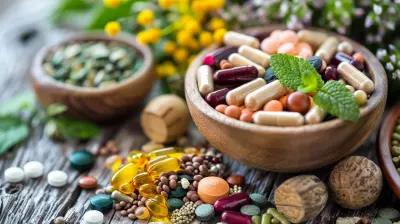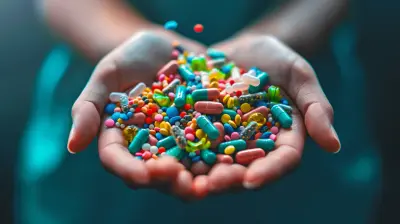Common Mistakes People Make That Hurt Gut Health
6 September 2025
Let’s be real for a second—gut health is a hot topic right now, and for good reason. That little ecosystem inside your belly is doing way more than just digesting your lunch. It’s influencing your immune system, mental clarity, skin, sleep, and even your mood. So yeah, your gut's kind of a big deal.
But even with all the buzz about probiotics, kombucha, and fermented everything, many people unknowingly do things that seriously sabotage their gut health. It’s easy to fall into these traps because some sound harmless—or even healthy. So, let’s break down the most common mistakes that are quietly doing a number on your gut and what you can do instead.
1. Overusing Antibiotics (When You Don’t Really Need Them)
Raise your hand if you’ve ever asked your doctor for antibiotics at the first sign of a sniffle. No shame—it happens. But here's the thing: antibiotics don’t just kill the bad bacteria; they wipe out the good guys too.Your gut is home to trillions of bacteria, and antibiotics don’t discriminate. Taking them too often strips your gut of beneficial microbes, leaving you vulnerable to digestive troubles, weakened immunity, and even mood issues.
What to do instead: Trust your body's immune system with mild illnesses. Only take antibiotics when they’re truly necessary and prescribed. If you do need them, load up on a good quality probiotic during and after your course to help rebuild your gut flora.
2. Eating Too Much Processed Food
Let's be honest—we all love convenience. But ultra-processed foods loaded with preservatives, artificial sweeteners, and emulsifiers can wreak havoc on your gut lining and microbiome.These foods often contain little to no fiber and are designed in a lab to be addictive. They can cause inflammation and feed harmful bacteria, pushing good bacteria out of balance. Not to mention, they don’t provide the nutrients your gut needs to thrive.
What to do instead: Aim for whole, unprocessed foods as much as possible. Think fruits, veggies, whole grains, legumes, and lean proteins. If it comes in a bag and has a laundry list of ingredients you can’t pronounce, maybe think twice.
3. Ignoring Fiber (Your Gut’s Favorite Snack)
Fiber is like fertilizer for your gut garden. It feeds and fuels the good bacteria, helping them grow stronger. Yet, most people don’t get nearly enough.Without enough fiber in your diet, beneficial microbes starve and die off. This opens the door to an overgrowth of harmful bacteria—a recipe for bloating, constipation, and chronic inflammation.
What to do instead: Aim for 25-30g of fiber a day. Load up on veggies, fruits (with the skin when possible), legumes, nuts, and seeds. Even tossing some chia seeds into your smoothie or oatmeal can make a big difference.
4. Not Managing Stress
Ever had a “gut feeling” or butterflies in your stomach? That’s not just in your head. Your gut and brain are deeply connected through the gut-brain axis. Stress messes with your gut bacteria, increases inflammation, and messes with digestion.Chronic stress can lead to leaky gut syndrome—a condition where the intestinal lining becomes compromised, allowing toxins to sneak into your bloodstream. Yikes.
What to do instead: Incorporate stress-reducing activities daily. Whether it’s yoga, deep breathing, journaling, or just zoning out to your favorite playlist, give your body a chance to reset.
5. Skipping Meals or Following Extreme Diets
Intermittent fasting may be trendy, but skipping meals constantly or jumping on restrictive diets can mess with your gut microbiome. It thrives on consistency, and erratic eating patterns can throw it off balance.Plus, extreme dieting can lead to nutrient deficiencies, which means your gut isn’t getting the fuel it needs to function properly—and neither are the bacteria living in it.
What to do instead: Eat regular, balanced meals. If you’re trying out a specific diet, make sure it includes diverse, gut-friendly foods and that you’re not over-restricting.
6. Not Drinking Enough Water
Water is the unsung hero of gut health. It helps break down food, absorb nutrients, and keep things…ahem…moving. Dehydration can slow digestion, leading to constipation and allowing waste to sit longer in your system than it should.What to do instead: Sip water throughout the day—not just when you’re parched. A general rule of thumb? Aim for at least 8 cups a day, and more if you’re active or sweating a lot.
7. Lack Of Sleep
Think gut health and sleep have nothing in common? Think again. Poor sleep patterns alter the composition of your gut microbiome, leading to inflammation and reduced immunity. Basically, your gut and your brain are gossiping all night long…and bad sleep is like bad news.What to do instead: Set a sleep schedule and stick to it—even on weekends. Aim for 7-9 hours of quality sleep per night. Ditch the screens before bed, create a relaxing bedtime routine, and make your bedroom a sleep-friendly zone.
8. Relying on Sugar and Artificial Sweeteners
A little sweet treat now and then? No big deal. But consistently eating high-sugar foods or using artificial sweeteners like sucralose or aspartame can tip your gut bacteria in the wrong direction.Sugar feeds harmful bacteria and yeast, like Candida, and artificial sweeteners can confuse your gut, leading to bloating and metabolic disturbances.
What to do instead: Cut down on added sugars and look for natural alternatives like honey or stevia (in moderation). Even better, retrain your taste buds to enjoy the natural sweetness of fruits.
9. Drinking Too Much Alcohol
Sure, a glass of red wine can have some health benefits. But drinking frequently or in large amounts can disrupt your gut bacteria and damage the protective mucus lining of your intestines.This can lead to inflammation and increase your risk for leaky gut, digestive issues, and even mood swings. Your gut is delicate—it doesn’t appreciate being flooded with alcohol.
What to do instead: Enjoy alcohol occasionally and mindfully. Try limiting it to weekends or special occasions, and always hydrate in between drinks.
10. Living a Sedentary Lifestyle
Netflix and chill is fine sometimes. But sitting for long periods without movement slows down digestion and reduces microbial diversity in your gut. Physical activity is essential—not just for overall health—but for keeping your gut bugs happy.What to do instead: Move your body daily. Even a 20-minute walk after meals can stimulate digestion and help balance your microbiome. You don’t need to become a gym rat—just keep it consistent.
11. Over-sanitizing Everything
In our quest to kill germs, we sometimes go overboard. Constant use of antibacterial soaps, hand sanitizers, and cleaning products can limit your exposure to beneficial microbes.Your immune system—and your gut—needs a bit of “dirt” to stay strong. Over-sanitizing can actually weaken your defenses in the long run.
What to do instead: Practice good hygiene, yes. But don’t obsessively sanitize everything. Let your kids play in the dirt. Cook with your hands. Let nature do its thing.
12. Taking Gut Health Supplements Without a Plan
Yeah, probiotics and prebiotics are great, but popping random pills without understanding what your body actually needs can backfire. Some strains of probiotics are great for certain conditions but useless for others.Also, not all supplements are created equal. Some don’t survive stomach acid to reach your intestines, where they’re needed most.
What to do instead: Before taking any gut supplement, talk to a healthcare provider or nutritionist. And remember—supplements should complement a healthy diet, not replace it.
Final Thoughts
Gut health isn’t just about avoiding bad foods or taking the right pills—it’s about creating a lifestyle that consistently supports your inner ecosystem. You don’t need to be perfect. Heck, we all indulge in pizza nights and skip workouts sometimes. But being aware of these common mistakes—and making small, conscious changes—can have a big impact over time.Treat your gut like a garden. Give it sunshine (aka positivity), fresh nutrients, water, and care. And in return? You’ll feel better, think clearer, and live a more energized life.
Because when your gut’s happy, the rest of your body follows suit.
all images in this post were generated using AI tools
Category:
Gut HealthAuthor:

Jackson Mahoney
Discussion
rate this article
1 comments
Laura Perez
Thank you for this insightful article! It's crucial to understand the impact of our choices on gut health. I appreciate the helpful tips shared here.
September 20, 2025 at 4:42 AM

Jackson Mahoney
Thank you for your kind words! I’m glad you found the tips helpful for improving gut health.


